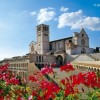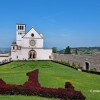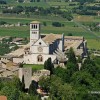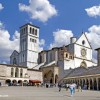Spoleto (PG) - Although traces indicate that man has inhabited this place since prehistory, the city of Spoleto was founded by the Umbrians around 1000BC.
Already in the 3rd century BC the city came under the influence of Rome in the form of a colony named Spoletium. After the severe defeat suffered by the Romans at the Battle of Lake Trasimene, Spoleto successfully fended off Hannibal’s besieging armies and became a valuable ally of Rome during the Punic Wars. The city was known for its magnificence already in 100BC but its fortunes followed closely those of the Roman Empire, through to its fall.
In 576 Faroaldus I chose the city as the seat of the Longobard Duchy of Spoleto, which became a vassal of the Franks in 774. With the division of the Carolingian empire, both Duke Guido III and his son Lamberto were crowned (890 and 892) Emperors of the Holy Roman Empire by the Pope. But Spoleto was a frequent bone of contention in the struggle for power between the Papacy and the Empire. In 1155 the city was destroyed by the armies of Frederick I Barbarossa, but in 1240 Spoleto passed under the Church even though it had declared itself a free city.
By 1296 a new circle of walls, which we see today, had to be built to include the larger city. During the period in which the Papacy was exiled to Avignon, Cardinal Egidio Albornoz gave orders for the vast Albornoz fortress to be erected, between 1359 and 1370. This became the seat of the Papal governor of the city, among whom there was for a time the daughter of Pope Alexander VI, Lucrezia Borgia (1499).
Between the 17th and 18th century the city’s noble families employed a conspicuous quantity of Roman architects and artists to renovate their family houses and the churches of Spoleto. During the French occupation under Napoleon, Spoleto was the headquarters of the Trasimene Départment. After the Restoration it became the seat of the Pontifical delegation. With the unification of Italy, however, the city’s importance declined in favour of Perugia, which was appointed the regional capital of Umbria.
Over 2500 years of history
[Source: Umbria OnLine]














